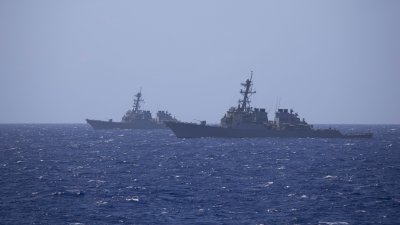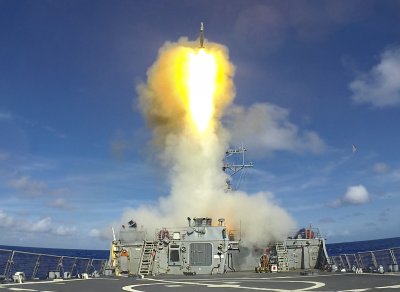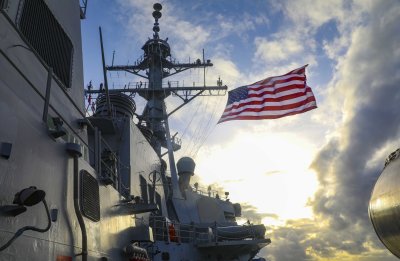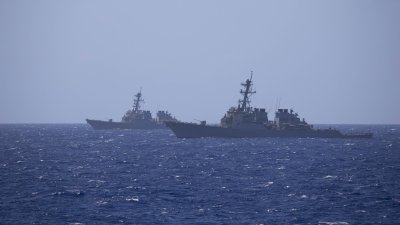The Biden administration continued its military signaling around China on Wednesday, as a U.S. Navy destroyer sailed through the sensitive Taiwan Strait for the seventh time in as many months this year.
The consistent gesture of support for democratic Taiwan, which Beijing claims as part of its territory, went ahead a record 13 times in the final year of the Trump administration in response to a marked increase in China’s military pressure against the self-ruled island.
During a speech on Tuesday, Secretary of Defense Lloyd Austin raised further concerns about Beijing’s “destabilizing military activity and other forms of coercion against the people of Taiwan.”
A statement published by the U.S. Seventh Fleet said the Arleigh Burke-class guided-missile destroyer USS Benfold “conducted a routine Taiwan Strait transit” on July 28, through international waters in accordance with international law.
“The ship’s transit through the Taiwan Strait demonstrates the U.S. commitment to a free and open Indo-Pacific. The United States military flies, sails, and operates anywhere international law allows,” the bulletin read.
China responded on Thursday by addressing not only the now monthly Taiwan Strait transits, but also the fact that it had been publicized online. The Americans were “publicly hyping up” the clear military signal, said a People’s Liberation Army spokesperson.
The online statement by Shi Yi, an army colonel in the PLA’s Eastern Theater Command, said Chinese naval and air force assets “tracked and monitored” the U.S. Navy warship through the passage. He said the U.S. was creating risks in the Taiwan Strait with its “frequent provocations.”
Taiwan’s defense official noted no irregularities as USS Benfold sailed northward through the strait, the island’s government-backed Military News Agency reported on Thursday.
It was the warship’s first deployment through the Taiwan Strait, after it conducted its maiden freedom of navigation operation (FONOP) in the South China Sea two weeks earlier. The FONOP around the Paracel Islands, which China claims by the name Xisha, drew criticism from Beijing.
Claims to Energy-Rich Sea
The U.S. Navy has regularly dismissed Chinese claims that its ships were “expelled” from the waters while carrying out FONOPs to challenge Beijing’s sweeping maritime claims to almost all of the energy-rich sea.
During a three-day visit to Singapore earlier this week, Defense Secretary Austin said the U.S. was “working with Taiwan to enhance its own capabilities and to increase its readiness to deter threats and coercion.”
In the address on Tuesday, Austin said: “Beijing’s claim to the vast majority of the South China Sea has no basis in international law. That assertion treads on the sovereignty of states in the region.”
“We continue to support the region’s coastal states in upholding their rights under international law. And we remain committed to the treaty obligations that we have to Japan in the Senkaku Islands and to the Philippines in the South China Sea,” he added.
Mass Communication Specialist 3rd Class Aron Montano/U.S. Navy

Mass Communication Specialist 3rd Class Aron Montano/U.S. Navy

Mass Communication Specialist 2nd Class Deanna Gonzales/U.S. Navy

Mass Communication Specialist 2nd Class Deanna C. Gonzales/U.S. Navy



















